Time: 4 p.m., March 7
Location: Corner Commons, first floor of the Blau Building at the Ross School of Business
The William Davidson Institute and the Weiser Center for Europe and Eurasia are proud to present a discussion with Sophia Opatska, Vice Rector for Strategic Development at Ukrainian Catholic University. Opatska, an entrepreneur and an academic, leads University’s Lviv Business School. More than two years after Russia’s invasion of Ukraine, Opatska will explain how business leaders and business educators have persisted toward economic resilience in the face of war.
Through student programs, projects and university partnerships, WDI has worked in Ukraine for more than two decades. Before Russia’s invasion, the Institute sent multiple teams of U-M MBA students to Lviv Business School of Ukrainian Catholic University to assess and make recommendations to improve their consulting process for small- and medium-sized businesses in the country.
This event is open to the public. Attendees are encouraged to register and submit questions in advance. Light refreshments will be served.
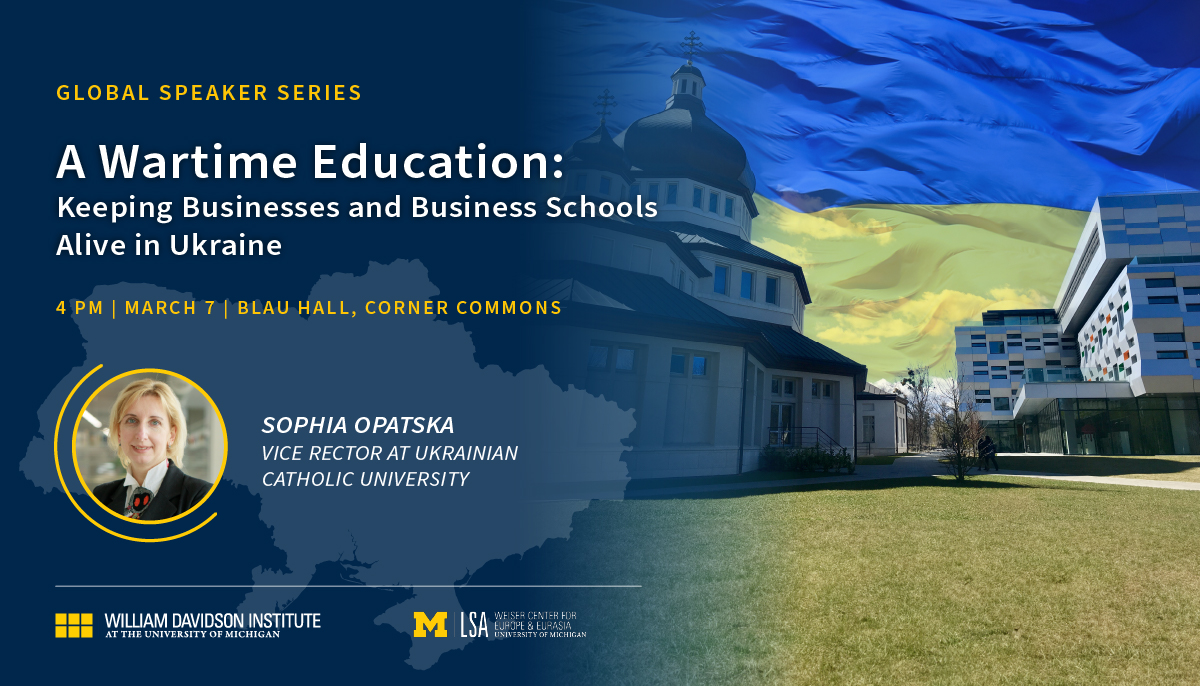
Teams have been working with LvBS Consulting to develop a consulting program focused on marketing. Specifically, a survey tool is being developed to help identify areas in which the clients can focus their efforts, and training materials have been identified to help educate clients in specific areas of marketing.
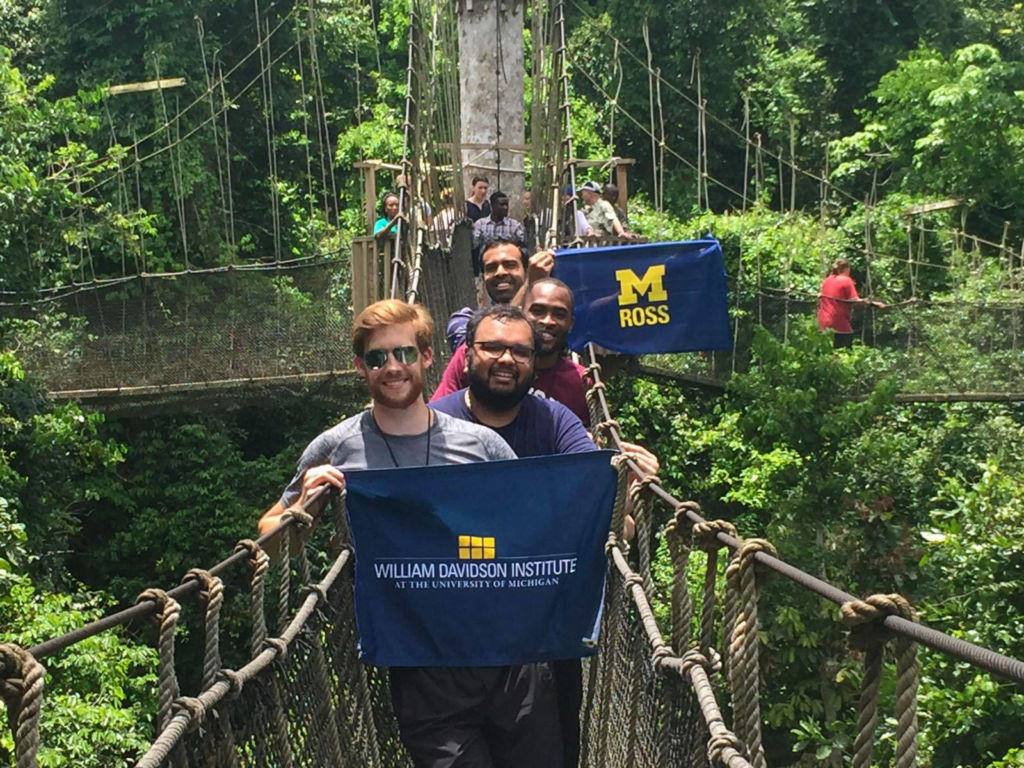
A 2018 WDI MAP team in Ghana.
Carrie Boyle, a MBA student at Michigan’s Ross School of Business, hopes to work in philanthropy somewhere in the U.S. after graduation. But for a couple of weeks in March, she is excited to be traveling to India as part of the school’s annual Multidisciplinary Action Projects (MAP).
“Working in another country is something I may never get the chance to do again,” she said. “This will be my first time in India and the country really interests me.”
Boyle and her teammates will work with Michigan Academy for the Development of Entrepreneurs (MADE), a nonprofit institute established at Ross by the Zell Lurie Institute for Entrepreneurial Studies, in partnership with WDI and Aparajitha Foundations. MADE works with entrepreneurship development organizations in India to help entrepreneurs operating small- and medium-sized enterprises (SMEs) succeed.
Boyle said she had some criteria when looking for MAPs that interested her.
“I wanted an opportunity to be on the ground having meaningful conversations with the people most immediately impacted by SMEs,” she said. “SMEs employ so many people and impact so many lives.”
Her teammate Shoko Wadano said she too is interested in working with SMEs, “which are very common in India.”
“I’m interested in how businesses mature in India,” she said. “I want to learn what pressures and impacts SMEs have in common, and what kind of value we can bring to them.”
WDI is sponsoring the MADE MAP project along with 10 others this year. MAP is an action-based learning course in which MBA students receive guidance from faculty advisors from WDI and Ross. Each project requires analytical rigor, critical thinking and teamwork. (Find out more about WDI’s MAP projects over the years here.)
After learning about their projects and conducting secondary research for several weeks, the student teams spend two to four weeks working with their organizations in the field.

David Butz
“The complementarities between the talents our students bring and what our sponsors need are sublime,” said David Butz, a WDI senior research fellow in the Healthcare sector who is an advisor on two projects. “Our students experience impact in brand new ways. Our sponsors learn, too, how disciplined management methods can yield dramatic innovations.”
Butz said he enjoys working with the student teams on MAP because it “poses such a unique challenge for both the students and their sponsor organizations, and forces us all to think big.”
“For me, the best achievements are tangible, direct and narrow but at the same time big and high-impact,” he said. “In our short time, can we help to break some key bottleneck, expedite a critical process pathway or otherwise liberate resources and expand capacity? Is the innovation scalable or replicable elsewhere? Do the students and organizations thereby feel empowered?”
Here is a summary of each WDI-sponsored MAP project:
Aravind Eye Care System – India
MAP Team: Rohan Dash, Sid Mahajan, Aman Rangan, Nik Royce
Aravind Eye Care System (AECS) is a vast network of hospitals, clinics, community outreach efforts, factories, and research and training institutes in south India that has treated more than 32 million patients and has performed 4 million surgeries since its 1976 founding.
AECS opened a tertiary eye care center in Chennai in September 2017 that will ultimately serve more patients than any other facility in the AECS system. The MAP team will formulate a detailed three-year strategic plan for Aravind Eye Hospital in Chennai.
CURE International, Inc. – Kenya, Ethiopia, Zambia, Uganda
MAP Team: Dominique James, Sarah Raney, Hannah Viertel, Olga Vilner Gor
CURE operates clubfoot clinics in 17 countries around the world, each tasked with helping children and families deal with the congenital deformity that twists the foot, making it difficult or impossible to walk.
For CURE, the student team will develop a strategic evaluation framework to assess opportunities for market entry and expansion building on global data.
Ghana Emergency Medicine Collaborative – Ghana
MAP Team: Benjamin Desmond, Benjamin Quam, Nicholas Springmann, Vishnu Suresh
The Ghana Emergency Medicine Collaborative aims to improve emergency medical care in Ghana through innovative and sustainable training programs for physician, nursing and medical students. The goal of the training programs is to increase the number of qualified emergency health care workers retained over time in areas where they are most needed.
The MBA team will formulate a detailed strategy to implement interoperable digital payment systems in Ghanian hospital emergency departments.
India Investment Fund – India
The India Investment Fund is working to become the first international, student-run fund at the Ross School of Business. Ross MBA students would be responsible for investing, managing and growing a real investment portfolio.
MAP Team: Charlie Manzoni, Patrick Riley, Queenie Shan, Sheetal Singh
The student team will conduct due diligence on Indian small- and medium-sized enterprises to assess viability for investments, and an appropriate financing instrument.
Infra Group – Ethiopia
MAP Team: Rin Chou, Chandler Greene, Yuki Ito, Brittany Minor
Infra Group is diversified international group with business units in financial services, industries and infrastructure development. Infra Group helps build a more prosperous society through global-scale business development with integrity as its top priority.
The MAP team will conduct due diligence on a group of small- and medium-sized enterprises (SMEs), and recommend which ones to invest in and what amount to invest.
Lviv Business School & Ukranian Catholic University – Ukraine
MAP Team: Blake Cao, Emily Fletcher, Kelsey Pace, Adam Sitts
Lviv Business School and Ukranian Catholic University is a private educational and research institution in western Ukraine.
The student team will undertake a needs assessment of the small- and medium-sized enterprises (SMEs) to determine if Lviv Business School should begin offering consulting services to these SMEs and if so, how those should be structured.
MADE – Poornatha/Aparajitha Foundations – India
MAP Team: Carrie Boyle, Lawrence Chen, Dillon Cory, Shoko Wadano
Michigan Academy for the Development of Entrepreneurs (MADE) is a nonprofit institute established at the Ross School of Business by the Zell Lurie Institute for Entrepreneurial Studies, in partnership with WDI and Aparajitha Foundations. MADE works with entrepreneurship development organizations in developing countries to give individuals operating businesses in these environments the knowledge and best practices they need to thrive.
The MAP team will develop an expansion plan for MADE in the southern Indian state of Tamil Nadu.
The Ihangane Project – Rwanda
MAP Team: Lauren Baum, Nadia Kapper, Paul Mancheski, Jason Yu
The Ihangane Project (TIP) empowers local communities to develop sustainable, effective, and patient-centered health care delivery systems that holistically respond to the needs of vulnerable populations. Partnering with Ruli District Hospital and its associated health centers, TIP is working to identify key strategies for improving health outcomes.
The student team will develop a business model to grow the ready-to-use therapeutic food that is used to treat severe, acute malnutrition.
WEEKEND MBA MAP PROJECTS
Awash Bank – Ethiopia
MAP Team: Matthew Campbell, Joshua Dodson, Joseph McCarty, Aman Suri
Awash Bank, a private, commercial bank, was established in 1995 and features more than 375 branches across the country.
The MAP team will develop a product that can provide capital to small- and medium-sized enterprises (SMEs) in Ethiopia by utilizing remittances already being sent back to that country. The students will work with the bank on all aspects of the loan product. They also will give the bank recommendations on how to monitor the loan and provide business support to SMEs that borrow from the fund.
Grace Care Center – Sri Lanka
MAP Team: Daniel Cady, Yizhou Jiang, Gerardo Martinez, Daniel Murray
The Grace Care Center (GCC) is a home to about 70 orphaned children that offers daycare services and vocational training. It also is home to several poor and displaced seniors, many of whom have chronic health issues such as hypertension and diabetes.
Past MAP student teams from the Ross School of Business developed a diabetic care center model for GCC. This year’s student team will examine the current model and make any needed updates and revisions.
International Clinical Labs – Ethiopia
MAP Team: Emily Mascarenas, Torre Palermino, Alexander Santini, Matthew Traitses
ICL was established in 2004 to provide quality laboratory service all over Ethiopia. ICL serves more than 240 health care centers throughout the country, and is expanding its service throughout Ethiopia.
The Ethiopian government is building its first medical waste incinerator facility outside the capital city of Addis Ababa and has committed to building seven more around the country. WDI is assisting a group of business managers with business plan advice who are interested in managing the business aspects of operating the incinerators. The MAP team will develop a proposal to be presented to the government later this year for the business managers to operate the incinerators.
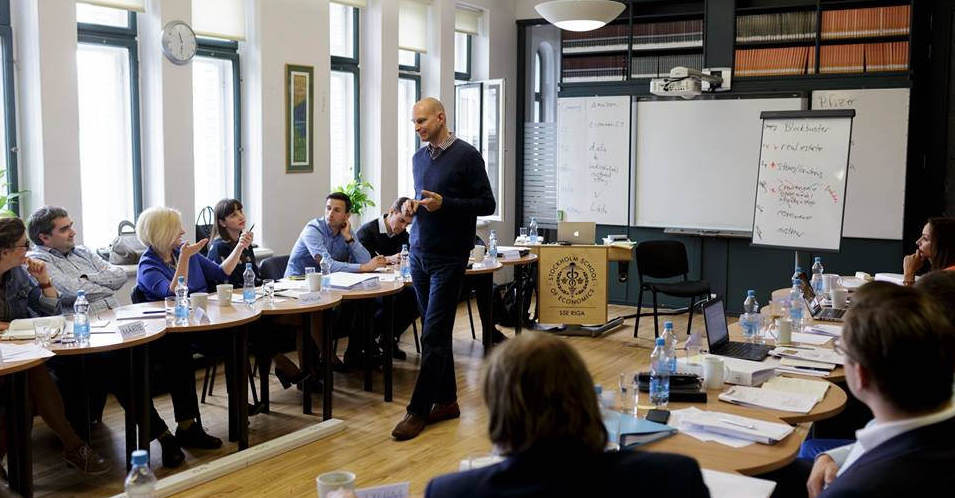 WDI’s executive education programs, delivered in partnership with the Stockholm School of Economics (SSE) in Riga, are attracting more international participants, bringing diverse opinions to the classroom and thereby adding value to the programs.
WDI’s executive education programs, delivered in partnership with the Stockholm School of Economics (SSE) in Riga, are attracting more international participants, bringing diverse opinions to the classroom and thereby adding value to the programs.
In past years, participants in the executive education offerings from WDI’s Education initiative at SSE Riga are citizens of host country Latvia and one or two neighboring Baltic countries. But for this year’s spring programs – the flagship, 10-day Strategic Management Program (SMP), Supply Chain and Logistics Management and Advanced Negotiations – drew participants not only from Latvia but also Russia, Chile, Estonia, Lithuania, Germany, Ukraine and even from as far away as Canada.
Santa Zeidaka, program manager at SSE Riga, said a key selling point is that its offerings are highly ranked in the Nordic and Baltic regions. She also said SSE Riga leverages its alumni network to spread the word on its programs and promotes them at conferences and on social media.
Zeidaka said a more international classroom benefits all the participants.
“Having an international group helps people open up more,” she said. “Participants get to see the problems from more diverse perspectives and this pushes participants to open their minds more, which is valuable when people work in international companies.”
For the popu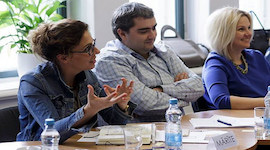 lar SMP – also known as a “mini MBA” – participants came from Latvia, Lithuania, Ukraine and Canada. The program, tailored for high potential, mid- to senior-level managers, features four modules – strategy, finance, marketing, and leadership – and is structured around an integrative strategic framework. The program, held in May, combines lectures, discussions, cases and exercises. Participants also conduct group work, which enhances their critical thinking, decision-making and teamwork skills.
lar SMP – also known as a “mini MBA” – participants came from Latvia, Lithuania, Ukraine and Canada. The program, tailored for high potential, mid- to senior-level managers, features four modules – strategy, finance, marketing, and leadership – and is structured around an integrative strategic framework. The program, held in May, combines lectures, discussions, cases and exercises. Participants also conduct group work, which enhances their critical thinking, decision-making and teamwork skills.
Amy Gillett, vice president of WDI’s Education Initiative, said the fact that the SMP drew participants from four countries speaks to its strong reputation. She said participants around the world are recognizing the great value of this program.
“The Strategic Management Program is greatly enriched by having such a global audience,” she said. “Since the program is highly interactive with participants sharing their experiences, these diverse viewpoints spark new ideas and connections. Next year, we expect to attract participants from even more countries.”
This article traces the development of management education in Central and Eastern Europe over the past 30 years and provide recommendations for the future of management education in this part of the world. The authors, Danica Purg and Alenka Braček Lalić of IEDC-Bled School of Management, identify emerging business issues in Central and Eastern Europe and the resulting opportunities for institutions in the region to respond to these challenges with appropriate management and leadership development.
This article is part of the 25 Years of Market-Based Solutions article series released in honor of the William Davidson Institute’s 25th anniversary. Since its founding in 1992, the Education Initiative at the William Davidson Institute has helped management education institutions around the world develop their capacity. We look forward to continuing this work — and sharing key learnings — over the coming decades.
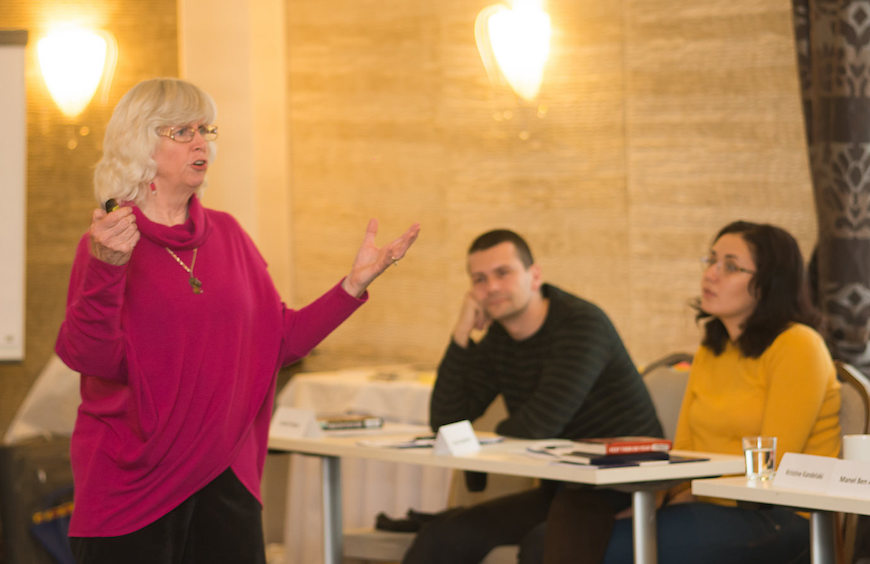
Professor Linda Gasser, WDI faculty affiliate and a founder of the Central Europe Human Resource Education Initiative, who led the NGO management session.
Non-governmental organizations (NGOs) around the world are facing increased scrutiny and even intimidation by government ministries and regulators in several emerging democracies. Equipping them with the managerial skills and tools they need to advance positive social and political change is critical to their missions, and was the focus of a four-day workshop in Bratislava, Slovakia earlier this month.
WDI, along with the Weiser Center for Europe and Eurasia at the University of Michigan and the Slovakia-based Pontis Foundation, organized the NGO Leadership Workshop. Twenty-five NGO leaders from 14 countries, including Uzbekistan, Kazakhstan, Ukraine, Moldova, and Georgia, participated in several highly interactive sessions during the workshop.
This was the second year WDI partnered with the Weiser Center, which sponsored the event, and the Pontis Foundation to coordinate the NGO Leadership Workshop. It comes at an especially challenging time for many NGOs. As communist regimes fell in Central and Eastern Europe, South Eastern Europe, and the former Soviet Union, civil society organizations emerged to help support the fledgling democracies in these regions. However, distrust in NGOs has generated new problems for their managers.
“NGOs from across this region are in a particularly difficult position these days,” said Amy Gillett, vice president of WDI’s Education Initiative. “Some of the countries stigmatize them as ‘foreign agents’ — meaning they are an enemy of the state and, therefore, under surveillance. This creates an atmosphere where people in the society do not want to associate with them.”
The NGO Leadership Workshop, held Dec. 6-9, attempted to maximize the effectiveness of the organizations by giving their leaders the necessary skills to properly interact with international partners, government stakeholders and the public. The daily workshop topics were: planning and sustainability of NGOs; essentials of NGO management; marketing strategy for the NGO; and, advocacy and public policy building.
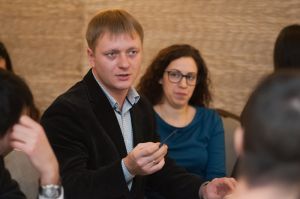 “The changes in the government of these countries cause tremendous stress,” said Professor Linda Gasser, WDI faculty affiliate and a founder of the Central Europe Human Resource Education Initiative, who led the NGO management session. “People need to find ways to mitigate this. The great value in this program is that participants are networking and understanding that there are others experiencing similar things.”
“The changes in the government of these countries cause tremendous stress,” said Professor Linda Gasser, WDI faculty affiliate and a founder of the Central Europe Human Resource Education Initiative, who led the NGO management session. “People need to find ways to mitigate this. The great value in this program is that participants are networking and understanding that there are others experiencing similar things.”
Many workshop participants cited the interaction with faculty members, guest speakers and each other as a key benefit of the program. They plan to remain in contact in the months to come and also will receive additional training through WDI’s interactive ExtendEd portal. This portal, designed and implemented by WDI, guides participants’ learning before, during and after a program, and encourages them to apply this knowledge back at their job.
Another workshop highlight was a presentation on the development of civil society in Slovakia by Martin Butora, who served as that country’s ambassador to the U.S. from 1999-2003. He also was one of the founders of the political movement Public Against Violence, which opposed communist rule in Slovakia.
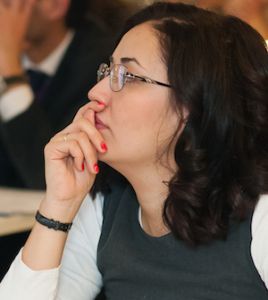 The presentation was followed by an engaging question-and-answer session with Ron Weiser, former U.S. ambassador to the Slovakia. In 2004, Weiser received the White Double Cross —the highest award given to non-Slovaks — from Slovak President Rudolph Schuster for his work as ambassador.
The presentation was followed by an engaging question-and-answer session with Ron Weiser, former U.S. ambassador to the Slovakia. In 2004, Weiser received the White Double Cross —the highest award given to non-Slovaks — from Slovak President Rudolph Schuster for his work as ambassador.
“Regardless of the countries we come from, we are all experiencing the same problems,” said Nadiia Bureiko, vice head of the Ukraine NGO, Quadrivium. “This program has created a valuable network for future cooperation.”
Stefan Veljkovic, program director of the Kosovo NGO, YEC Synergy, praised the workshop faculty and speakers. He said he learned how to build organizational capacity, recruit people to join a cause and that there are “many ways to get across a message.”
Lenka Surotchak, executive director of the Pontis Foundation, said it might be difficult for someone living in an established democracy to understand the day-to-day fear, struggles and sacrifices of “people fighting for rule of law and attempting to undertake democracy.”
“They do it because they believe in freedom and a better future in their country,” she said. “Interaction with the faculty from one of the renowned U.S. universities, the University of Michigan, the knowledge and belief in their skills, mission and work give them the power and optimism to continue their important job.”